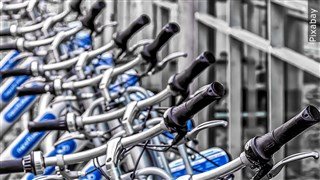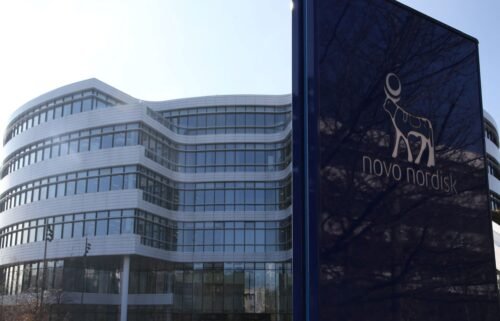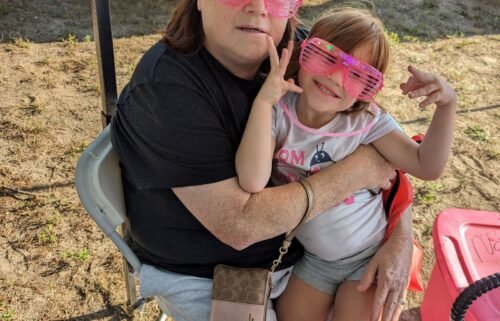The Future of Surveillance: Dr. Sanjay Gupta’s podcast for May 15

Mobile apps, QR codes, facial recognition. Everyone is looking to technology for help in this pandemic, but some experts worry that this could infringe on individual privacy, even once the pandemic has passed. CNN’s Chief Medical Correspondent Dr. Sanjay Gupta asks public health and privacy experts what should be the role of technology in our ongoing battle against Covid-19.
You can listen on your favorite podcast app or read the transcript below.
Paula Hancocks, CNN international correspondent: In my neighborhood here in Seoul, there was a confirmed case. I had the emergency alert. “There was a confirmed case. They went to your local supermarket, on this date between these hours.”
Dr. Sanjay Gupta: That’s Paula Hancocks, CNN’s international correspondent based in South Korea. One day, she got a text message from the government providing her information about a confirmed Covid case near her.
Hancocks: And when I went to the supermarket later, they explained that this individual had used a self-checkout counter and told me which one. It even told me that this individual had bought dried chiles.
Gupta: What Paula is describing may sound like something out of science fiction. … But that’s what South Korea is doing to fight the pandemic right now. And so far, it’s working.
As the United States begins to open up, experts have said that rigorous contact tracing is an important part of the safe way forward.
Could what we see in South Korea be our future as well? And how much surveillance is too much?
I’m Dr. Sanjay Gupta, CNN’s chief medical correspondent. And this is “Coronavirus: Fact vs. Fiction.”
The Covid-19 pandemic is changing our lives in so many ways, and what’s going to happen in the future is still unclear.
Are we going to have to download apps? Will those under quarantine have to wear wristbands? Will we be scanned for fevers every time we step into an office or a restaurant?
I’ve been hearing all sorts of questions like these, so I wanted to speak with Jennifer Nuzzo. She’s an epidemiologist at the Johns Hopkins Center for Health Security.
I wanted to know what role technology might play in our fight against this pandemic. Could we soon be using these contact tracing apps here in the United States?
Jennifer Nuzzo, senior scholar, Johns Hopkins Center for Health Security: I think it’s inevitable, and in fact, it’s actually already happening, that public health agencies are going to use apps to help them conduct contact tracing. Whether these apps fundamentally change how contact tracing is done remains to be seen. I personally would be a little bit worried if we used apps instead of people. It’s not clear to me that we would get better data that way.
The question is how are we going to use it, and what features of the technology are we going to use? It’s one thing to use it to keep track of data and to help you analyze data; it’s another thing to use it to figure out exactly where someone’s been over the last 14 days.
And I think there are some important operational questions that need to be answered about those approaches as well as some potential legal and ethical questions.
Gupta: We do use contact tracing in this country for other diseases. A lot of people are hearing this term for the first time, but with foodborne illnesses and things like that, that already happens, right?
Nuzzo: Yeah. It’s a traditional tool of public health. For instance, in tuberculosis outbreaks, measles outbreaks. And there is, you know, case investigations that happen with foodborne outbreaks, too.
I would say the frequency with which it’s used has probably decreased in recent years, purely due to resources. It’s incredibly resource-intensive to do contact tracing.
As public health departments over recent years have suffered budget cuts and declining resources, their abilities to do contact tracing has declined, a that’s, I think, one of the unfortunate kind of preparedness erosions that we’ve seen over time, that we’re now in the midst of a pandemic trying to make up for by hiring possibly hundreds of thousands of new contact tracers.
Gupta: When you think about the app-based technologies again and merging that with some of these human contact tracers to help supplement that sort of work, can you give some idea of what life would look like then?
Nuzzo: So there are a few different approaches. There’s one method where the phone tracks your movement. It pings off of cell towers and it knows where you’ve been. And authorities potentially could take advantage of the ability of your phone to say where you’ve been to, once you become a case, potentially look back at where you’ve been for the last 14 days and then use that to identify places where you may have exposed people to try to get in touch with people who may have also been at that same place.
There are other approaches where you use the phone’s ability to kind of tell who you’ve been near and to try to find people that you may have exposed that way. That’s seen as slightly less invasive because it’s more about identifying who’s been near you rather than exactly determining where you’ve been.
Typically, in the US when we do contact tracing, it starts with an interview where you ask the patient, basically, remember all the places they’ve been. When you’re talking about 14 days, though, it can be tough for people to remember exactly. And so sometimes you have to use other methods to maybe fill in the gaps.
For instance, for foodborne outbreaks, we’d try to figure out where you spent money over the last 14 days as a proxy for where you may have been. But we haven’t yet in the US seen widespread use of the cell phone-based technologies, the location services or the more Bluetooth ones that tell you who you’ve been near.
And I think there has been some interest in potentially using these technologies, but in my view, these are the ones that have some questions around them in terms of public acceptability and what the limitations for their use are.
Gupta: So what does this mean for all of us? Are we moving toward a Big Brother surveillance state?
Government officials are now calling upon Silicon Valley’s tech leaders to try and help.
Eric Schmidt, former Google CEO: We need to view this as an information problem, where we need to come up with estimates for where the disease is, and when we can find hot spots, put them out.
Gupta: Eric Schmidt used to be the CEO of Google. Now, he’s leading up a 15-member commission to help guide New York toward using new technology in the wake of Covid-19.
Schmidt: The Google-Apple collaboration preserves your privacy, but it’s completely voluntary.
Gupta: Apple and Google are collaborating to develop software that would enable Bluetooth-based tracking on their devices. If users opt in, this data would be shared with governments and public health authorities.
And then there is Clearview AI, a facial recognition technology company.
Hoan Ton-That, Clearview CEO: What we do is we have a database from day one of over 3 billion photos. We have a mobile app and a desktop app. And we also have the highest accuracy out there in the market.
Gupta: The company claims that they can scan public surveillance camera footage to identify people who might have been in contact with confirmed coronavirus patients.
Last month, they told NBC News that they’re already in talks with several state and federal agencies to help with contact tracing.
Meanwhile, countries around the world are trying different approaches to keep the pandemic at bay. Some of them are using more extensive surveillance than others.
David Culver, CNN International Correspondent: China’s reopening is happening under the watchful eye of big data and perhaps Big Brother.
Gupta: That’s CNN’s international correspondent, David Culver. He’s been reporting from Shanghai and Wuhan throughout this pandemic.
Culver: Local governments tracking the movements of hundreds of millions. We noticed they started this effort back in mid-February, arriving in Shanghai from Beijing, each arriving passenger required to write down health and travel history and register for your personal QR or bar code. Walking into a restaurant, hotel, shopping mall, you’re expected to show it.
Here in Shanghai, shop owners and hotel managers have told us, a green means you’re clear to go in; yellow or red suggests you’ve been in an area with high exposure to the virus, and it could mean quarantine.
Gupta: Another country to note: South Korea, which has been applauded for how well it handled the pandemic, thanks to its thorough testing and contact tracing process.
Here again is Paula Hancocks, CNN’s international correspondent in South Korea.
Hancocks: They have a special team within the health ministry, and they are effectively cyber detectives. They are the ones who are trying to track down every last person who could potentially have this virus. And I spoke to one of the men who was the cyber detective.
And he said, all they need is a mobile phone number of somebody who has tested positive. They need a credit card number, and they put that into their system. And within 10 to 20 minutes, they know exactly where that individual has been for about two weeks. They know which locations. They know how long they’ve spent there.
And then they can use that information to then warn the rest of the country if they have been in that particular area.
Gupta: But as you might imagine, this system has raised some concerns about privacy rights. Recently, there was an outbreak at a nightclub district in Seoul.
Hancocks: And local media revealed quite early on that some of these clubs were gay clubs. Now this is after local authorities had already given out details of the 29-year-old man who they believe was the first to start spreading in this area. And that person’s workplace and employer was then very quickly made aware that this man was homosexual. Now, you might not think that’s too much of an issue, but there is homophobia here in South Korea.
Gupta: Could what’s happening in South Korea also happen in the United States? There are real consequences to losing our privacy. So where do we draw the line?
Privacy rights experts say that we should be wary of companies promising grand tech solutions.
Jennifer Granick, surveillance and cybersecurity counsel, American Civil Liberties Union: Almost immediately, what we saw was a number of companies crawling out of the woodwork, offering solutions for Covid-related problems based on snake oil science and sketchy data.
Gupta: That’s Jennifer Granick, an attorney from the American Civil Liberties Union. Her work focuses on surveillance and cybersecurity.
Granick: People are really uncomfortable putting an app on their phone that’s designed by big companies or by the government that’s going to track them and collect health information about them.
Gupta: The ACLU recently put out guidelines about how we can safely and effectively use technology in contact tracing while also minimizing our privacy risks.
Granick: I think it’s really important to design the technology in a secure and private way from the beginning. And that means that you collect as little data as possible, and the user has control over it, that the user can delete their data, can delete the app. And that the information is used for the public health purpose.
Gupta: Some of us may feel like we have nothing to hide, and so nothing to fear. But we have to remember that some people have a lot more at risk, and they should also be protected.
Granick: In the United States, the people who are most afraid of tracking are spouses who have been abused and are fleeing domestic violence; immigrants who fear that their relatives are going to get arrested and deported; to black and brown communities who are historically overpoliced.
And we need to make sure that the health response helps everybody and not just people who have a low sensitivity about their privacy.
Gupta: Ultimately, we need to really think carefully about the risks and benefits of using this sort of technology in our battle against Covid-19.
Granick: I think Americans do have to be very careful that we’re not building surveillance that isn’t going to work or that we’re stuck with surveillance infrastructures that are going to haunt us after the crisis is over.
Gupta: In our race to beat the virus, it is tempting to put our hopes in technology that promises a quick and easy solution. But we also need to know that data about our lives will be protected — now during this crisis, and after this is all over.
We’ll be back Monday. Thanks for listening.
…
“Coronavirus: Fact vs. Fiction” is a production of CNN Audio.
Megan Marcus is the executive producer. Felicia Patinkin is the senior producer, along with Nadia Kounang and Amanda Sealy from CNN Health. Raj Makhija is the senior manager of production operations.
This week’s episodes were produced by Evan Chung, Anne Lagamayo, Zach St. Louis and Zoë Saunders.
Our associate producers are Rachel Cohn, Emily Liu, Eryn Mathewson and Madeleine Thompson.
Nathan Miller is our engineer, and David Toledo is the team’s production assistant.
Special thanks to executive producer of CNN Health Ben Tinker, as well as Ashley Lusk, Courtney Coupe and Daniel Kantor from CNN Audio.




